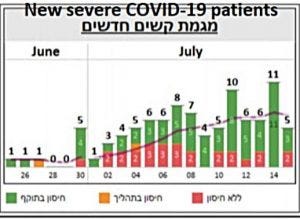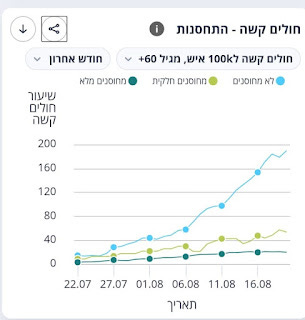Lies, Statistics, and Outrageous Lies
There's a famous saying that there are three kinds of lies: lies, damned lies, and statistics. The idea is that statistics can be even more pernicious than lies, since they use information which is true but present it in a way which is completely misleading.

A disturbingly powerful example of that is making the rounds at the moment. People are spreading a chart showing the percentage of seriously ill Covid patients in Israel that are vaccinated. It's the majority! This is used to send a powerful message that the vaccine does not work, or is even harmful.
Of course, if you have a better understanding of the topic, you'll realize why this is backwards. It's like saying that since the majority of car crash victims are wearing seatbelts, this shows that wearing seatbelts is dangerous. Whereas the truth is that since 99% of people in cars wear seatbelts, then obviously most crash victims are wearing seatbelts, and it doesn't mean that they don't help.

The overwhelming majority of people in Israel are vaccinated. So of course, even when the vaccine greatly reduces your chances of getting seriously ill, there will still be more vaccinated people who are seriously ill. The relevant statistic is not how many sick people there are in absolute terms, but rather how many sick people there are as a percentage of that sector of the population. And what we see is that being vaccinated drastically reduces your chances of getting seriously ill and dying.
But I wonder if there's another problem here. We've been taught that statistics can be so pernicious because they take technically true information and distort its significance. Yet there seems to be an assumption that in general, information which is presented - especially if it looks impressive - is true, or at least arguably true. But I've seen a few cases in which people happily spread absolutely outrageous flat-out lies.

This morning I saw a screenshot of an article from the British Medical Journal about the danger of vaccines. Being from England myself, I have benefited from how the word "British" lends anything an air of prestige, and when it's put together with "Medical Journal," the effect is particularly powerful. The reactions of numerous people showed that the article had made a big impact on them.
The only thing is, a simple Google search showed that it wasn't actually from the British Medical Journal at all. It was actually from "The Light Paper," a bonkers far-left British conspiracy theory rag associated with Piers Corbyn (a man who makes his brother Jeremy look sane). But how many people actually bother to do that Google search? Most people will just assume that the "British Medical Journal" has shown there to be serious concerns about the vaccine!
A few weeks ago, I came across an even more bare-faced example. A friend was given a recommendation for a highly accomplished doctor, a psychoneurologist who is very successful at helping people with various problems. They passed on the recommendation to me for my opinion, and I agreed to look into it.
The first thing that I did was Google his name. There were about 900 results, which instantly set off alarm bells. After all, between all the cross-links and so on, most accomplished people have many, many thousands of Google hits.
I then went to his personal website, which had an impressive list of his accomplishments. He served as the U.S. Liaison for the Middle East Peace Process. He co-authored the Jerusalem Spiritual Peace Accord. He earned the coveted title of the UK’s Most Influential Speaker. He is the founder and dean of a university. He is the Chief Psychoneurologist for the American Board of Psychoneurology. And he also received rabbinic ordination and is a kabbalist!
It sounded amazing. And once again, a few minutes of Googling revealed that it wasn't actually true! Not that it was entirely fabricated, but rather that meaningless things were being given grandiose titles.
There is no record of any "U.S. Liaison for the Middle East Peace Process" online whatsoever. He awarded himself this title.
There is no record of any "Jerusalem Spiritual Peace Accord" online whatsoever. It was nothing more than his own ideas.
There is no "coveted title" of "the UK’s Most Influential Speaker." It's an award given by a Jewish students' group at a university.
The university of which this person is founder and dean has precisely one person on staff; himself.
The "American Board of Psychoneurology" does not have anyone at all listed as actually being on the board, and as far as I can make out, it is actually just one person - this person.
Then I suddenly realized that the word psychoneurology was different from neuropsychology and was an unfamiliar term to me. So I googled that too. Google was pretty sure that I actually meant neuropsychology, and kept giving me results for that word (which has 32 million results), but when I insisted that I really meant psychoneurology, I discovered that the term does not exist in either the dictionary or Wikipedia, and almost all of the paltry instances of it online are associated with this person.
But how did he get his Phd? Incredibly, in a YouTube video, he freely admits that he gave it to himself, because there was nobody else qualified to give it to him!
Now, it's entirely possible that this person is very good at improving people's lives, and I wish him success with that. Still, I would be wary about giving money to somebody who makes such utterly fraudulent claims about their accomplishments and qualifications. And how many people are actually going to research his claims to see if they are valid?
A friend of mine, who shares various articles which I consider to contain pseudo-science and other distortions, asked me if I'm against sharing articles and letting people draw their own conclusions. I answered yes, absolutely. The fact is that most people are not capable (or willing) of doing the necessary research required to evaluate the truth of what they read. And so all of us have a responsibility to only share information that is credible. These days, it's a matter of life and death.
If you'd like to subscribe to this blog via email, use the form on the right of the page, or send me an email and I will add you.


